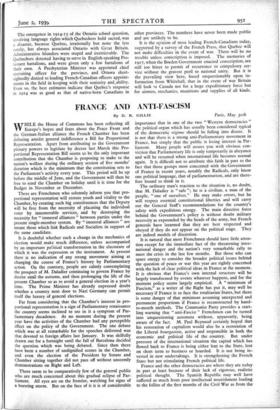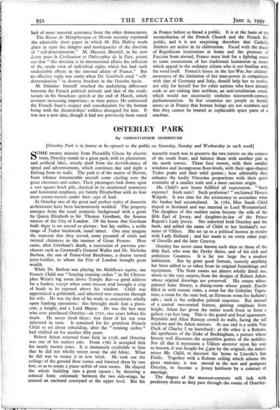FRANCE AND ANTI-FASCISM
By D. R.
WRILE the House of Commons has been reflecting all Europe's hopes and fears about the Peace Front and the German-Italian alliance the French Chamber has been debating amidst general indifference a Bill for Proportional Representation. Apart from attributing to the Government plenary powers to legislate by decree last March this Pro- portional Representation Bill seems to be the only important contribution that the Chamber is proposing to make to the nation's welfare during the ordinary session of five months' duration which is the minimum that the constitution sets to the Parliament's activity every year. This period will be up before the middle of June, and the Government will then be free to send the Chamber on holiday until it is time for the Budget in November or December.
There are Frenchmen who solemnly inform you that pro- portional representation will restore youth and vitality to the Chamber, by creating such big constituences that the Deputy will be free from the necessity of placating the individual voter by innumerable services, and by destroying the necessity for " immoral alliances " between parties under the present single-member system. By " immoral alliances " are meant those which link Radicals and Socialists in support of the same candidate.
It is doubtful whether such a change in the mechanics of election would make much difference, unless accompanied by an important poitical transformation in the electorate of which it was the expression or the instrument. At present there is no indication of any strong movement aiming at changing the course of France's history by Parliamentary action. On the contrary, people are calmly contemplating the prospect of M. Daladier continuing to govern France by decree until the autumn, and then prolonging the life of the present Chamber so as to avoid a general election in a year's time. The Prime Minister has already expressed doubt whether a country next door to Nazi Germany can permit itself the luxury of general elections.
Far from considering that the Chamber's interest in pro- portional representation is a sign of Parliamentary renaissance the country seems inclined to see in it a symptom of Par- liamentary decadence. At no moment during the present year have the activities of the Chamber had any perceptible effect on the policy of the Government. The one debate which was at all remarkable for the speeches delivered was that devoted to foreign affairs last January. It was skilfully drawn out for a fortnight until the fall of Barcelona decided the question which was being debated. Since then there have been a number of undignified scenes in the Chamber, and even the election of the President by Senate and Chamber sitting together did not pass off without unseemly demonstrations on Right and Left.
There seem to be comparatively few of the general public who are much concerned about this gradual eclipse of Par- liament. All eyes are on the frontier, watching for signs of a bursting storm. But on the face of it it is of considerable importance that in one of the two " Western democracies " the political organ which has usually been considered typical of the democratic regime should be falling into disuse. It is not that there is a strong anti-Parliamentary movement in France, but simply that the public is losing interest in Par- liament. Many people will assure you with obvious con- viction that Parliamentary life is only temporarily in abeyance and will be resumed when international life becomes normal again. It is difficult not to attribute this faith in part to the fact that those groups most concerned with the Government of France in recent years, notably the Radicals, only know one political language, that of parliamentarism, and are there- fore bound to think in it.
The ordinary man's reaction to the situation is, no doubt, that M. Daladier is " safe "; he is a civilian, a man of the people, " one of ourselves." He may make errors, but he will respect essential constitutional liberties and will carry out the General Staff's recommendations for the country's safety with expeditious energy. The main directive force behind the Government's policy is without doubt military necessity as expounded by the heads of the army, but French generals have leearned that they are best respected and obeyed if they do not appear on the political stage. They are indeed models of discretion.
It is natural that most Frenchmen should have little atten- tion except for the immediate fact of the threatening inter- national danger and the nation's very remarkable rally to meet the crisis in the last few months. But those who can spare energy to consider the broader political issues behind the question of peace or war this year are rightly concerned with the lack of clear political ideas in France at the moment. It is obvious that France's own internal structure will be largely transformed by events whatever happens, and for the moment policy seems largely empirical. A " minimum of Fascism," as a writer of the Right has put it, may well be necessary if France is to face the totalitarian States, but there is some danger of that minimum assuming unexpected and permanent proportions if France is reconstructed by hand- to-mouth methods. The Communist Party provides a start- ling warning that " anti-Fascist " Frenchmen can be turned into unquestioning automata without, apparently, being aware of the fact. M. Paul Reynaud certainly hoped that his restoration of capitalism would also be a restoration of the Liberal bourgeoisie, active and responsible in both the economic and political life of the country. But under pressure of the international situation the capital which has flowed back to France is being either lent to the State, lent on short term to business or hoarded. It is not being in- vested in new undertakings. It is strengthening the French State but not stimulating French political life.
France and the other democracies are where they are today in part at least because of their lack of vigorous, realistic political thought. The Spanish Republic may well have suffered as much from poor intellectual nourishment leading to the follies of the first months of the Civil War as from the lack of more material assistance from the older democracies.
The Revue de Metaphysique et Morale recently reprinted the admirable short paper in which M. Elie Halevy made plain in 192o the dangers and inadequacies of the doctrine of " self-determination." M. Maurice Blondel, in his new Lutte pour la Civilisation et Philosophie de la Paix, points out that " this doctrine is in international affairs the reflexion of the crude view of individual rights which has had such undesirable effects in the internal affairs of France." But no effective reply was ready when Dr. Goebbels used " self- determination " to destroy freedom in the Danube basin.
M. Daladier himself touched the underlying difference between the French political attitude and that of the totali- tarians in his broadcast speech at the end of March, which assumes increasing important= as time passes. He contrasted the French State's respect and consideration for the human being with the dictatorships' ruthless disregard for him. It was not a new idea, though it had not previously been stated in France before so broad a public. It is at the basis of the reconciliation of the French Church and the French Re- public, and it is not surprising therefore that Catholic thinkers are active in its elaboration. Faced with the decay of Republican institutions at home and the pressure of Fascism from abroad, Frances must look for a fighting creed to some restatement of her traditional humanism in terms which appeal to the ordinary citizen who is not familiar with the word itself. France's losses in the last War, her citizens' awareness of the limitation of her man-power in comparison with that of Germany and Italy, should help her to evolve, not only for herself but for other nations who have already sunk or are sinking into serfdom, an anti-totalitarian creed, which would not necessarily enshrine nineteenth-century parliamentarism. In few countries are people so keenly aware as in France that human beings are not numbers and that they cannot be treated as replaceable spare parts of a machine.











































 Previous page
Previous page